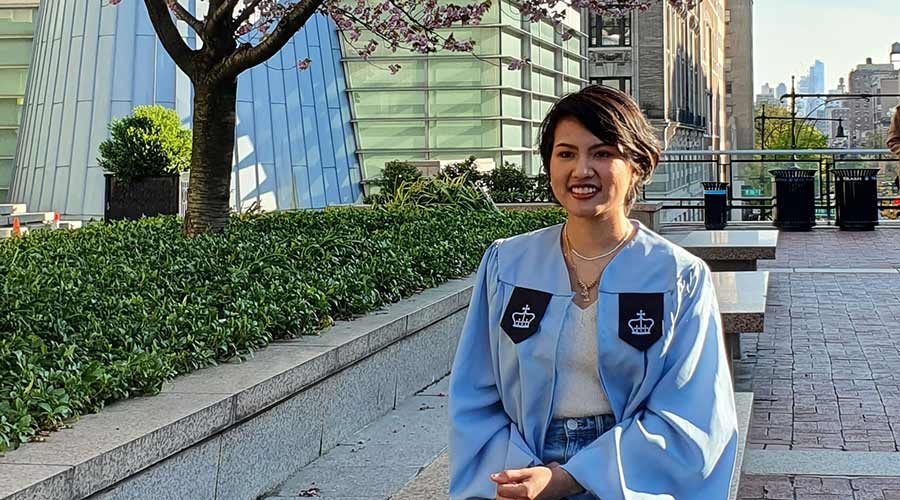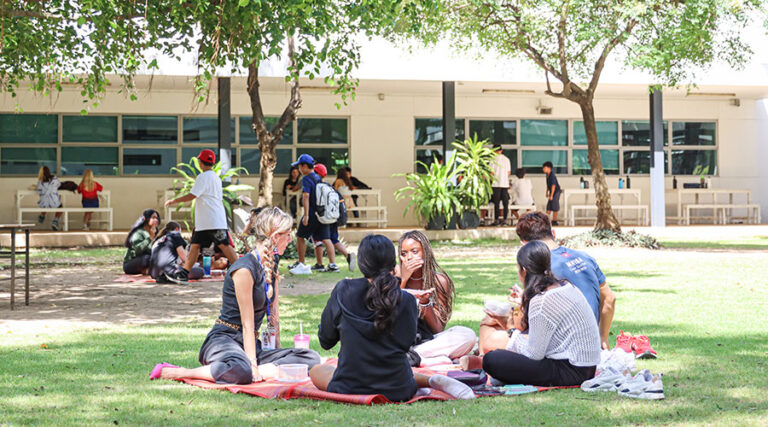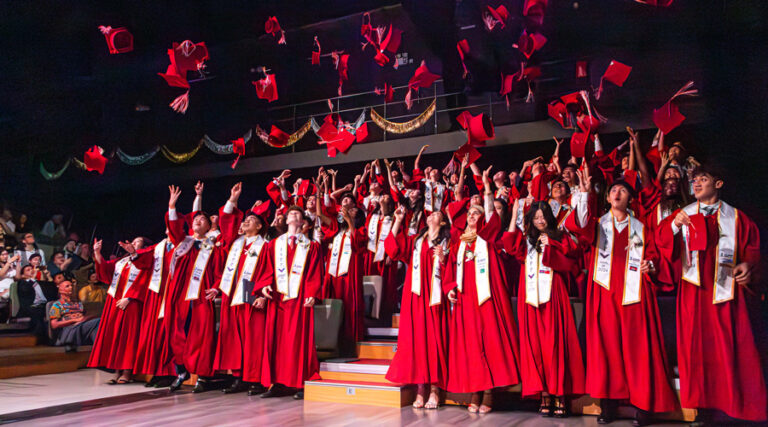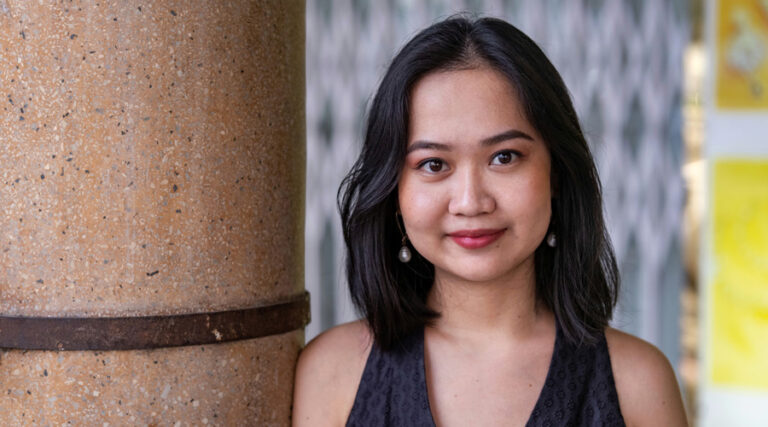Alumni Interview: Vimuolea Hang
Years at ISPP 2006 – 2013 | Class of 2013
Hello, everyone! I’m Vim.
I was born and raised in Phnom Penh, Cambodia. Before ISPP, I lived in Canberra, Australia for two years when I was around 6 or 7 years old (2000-2002), while my mum was doing her Master’s program. I then shuffled through different schools when I came back to Cambodia and studied at ISPP from Grade 6 until I graduated from high school.
While I was studying at ISPP, I was extremely interested in literature, art, and economics. So, I decided to major in economics and minored in studio art and French at Macalester College in St. Paul, Minnesota. I adjusted quite well in college, despite the extremely cold winters (there was even a polar vortex during my first year).
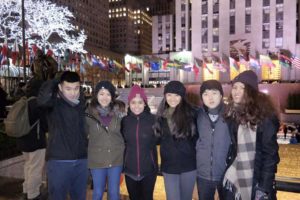
To this day, I am extremely grateful for the knowledge as well as the mentorship and wisdom I have received from teachers and professors at ISPP and Macalester. My experience at ISPP provided me with a global perspective, exposed me to different cultures, beliefs, and shaped me into a well-rounded individual. Macalester broadened my worldview and further developed my analytical skills and critical thinking. In addition to my major/minor-related subjects, I was educated on a myriad of topics spanning from race, gender, and sexuality to class, religion, mental health and its intersections through coursework, discussions with academic advisors, mentors, and my peers.
This period was one of the most formative years of my life as it instilled within me invaluable insights and significantly influenced my values; it made me question what I wanted to do in life and what I can do to serve my community, as opposed to following a path that (I felt) was paved for me. Yet, this elevated sense of awareness concurrently made me rather anxious about my future, which led me to place substantial emphasis on my studies (which isn’t necessarily a bad thing, had it been conducted in a more balanced manner), instead of fully embracing the college experience.
I subsequently moved back to Cambodia post-graduation and worked at the General Department of Policy at the Ministry of Economy and Finance for roughly a year (2017-2018). Not only was I able to put my economics knowledge into practice in the policy realm, but I also had the opportunity to attend capacity building courses and workshops at the department; it was such an engaging and intellectually-stimulating experience, that motivated me to apply to graduate school.
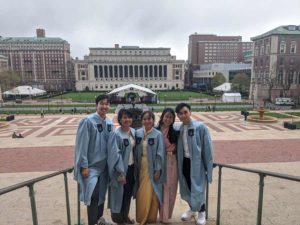
Fast forward to 2021, I have now graduated from Columbia University’s School of International and Public Affairs (SIPA), with a Master’s in Public Administration, wherein I concentrated in Economic and Political Development and specialized in Management. Thankfully, this time around, I was able to strike a balance between my studies, professional experience (via interning at UNDP Cambodia), and socializing with my colleagues in the program. As for now, I have resumed work at the Ministry of Economy and Finance – still on my journey to learn, grow, and ever so eager to know what life has in store for me.
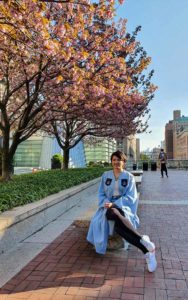
Which countries have you travelled to?
Besides Australia and the United States – countries in which I have resided – I have travelled to Thailand, Vietnam, and Laos (some of those visits were for MRISA volleyball, soccer, and basketball), Singapore, Malaysia, Indonesia, China, France, Italy, Switzerland, and the UK. I do want to explore more places, but we will see post-Covid-19.
How did you adjust to the new culture when studying in the USA?
ISPP broadened my worldview – which eased my transition. Even so, I found that the location and academic institutions I was in were even more progressive relative to what I had been used to back in Cambodia. I initially had a bit of a culture shock, especially since I had formerly been rather reserved and super shy. However, immersing myself in this new culture helped me step out of my comfort zone; in addition to being educated on topics pertaining to daily realities regarding intersections of race, class, and gender politics, I developed my own sets of opinions and became more vocal. In retrospect, living in a new country also helped me become more independent and learn how to figure things out on my own and I believe these experiences heavily influenced who I am today.
What are your recommendations to those moving to new countries?
My initial response when moving to new countries has usually been a mixture of excitement and apprehension of the uncertainty. Yet, thanks to the international demographic in the institutions I was in, I was able to form meaningful friendships with people of shared values, similar and dissimilar backgrounds that provided me with an invaluable support system. Aside from creating bonds, I would also recommend getting to know the country via engaging in cultural exchanges through dialogue, food, and taking advantage of the local festivities.
Has your international school experience shaped your worldview? How?
While I highly value and respect my Cambodian roots and culture, I also grew up with relatively rigid social and gender norms when I was in the public school system (2002-2005). This spanned from upholding certain beauty standards rooted in colourism and one that favoured certain body types, to general social expectations and inhibitions placed on me because of my gender. This includes not being to play “rigorous sports”, being “obedient”, especially relative to male-identifying individuals; we even used to have to study the code of conduct for women which had only been abolished from the education system in 2007. As such, being in an international school setting, and ISPP in particular, allowed me to surround myself with individuals of different cultures, experiences, and social conditions, which provided me with a global perspective and enabled me to become more open-minded. I also felt more empowered; I was introduced to new concepts and I was in an environment that was relatively more conducive to self-expression, self-discovery, individuality and to be frank, I became more aware of certain issues and thus became less judgemental and had less of a parochial perspective.
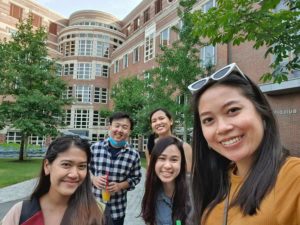
What are your hobbies? What do you end up doing in your spare time?
During my spare time, I like to indulge in good old Korean drama marathons and listen to music; shout out to T.O.P from Big Bang (I first saw him in a K-drama called I am Sam (2007) in Grade 6, which introduced me to the world of K-drama and K-pop and have been hooked ever since). I also really like to read novels (some of my favourite authors and poets include Carol Ann Duffy, Haruki Murakami, and Margaret Atwood) and if I am feeling inspired, I like to write some proses and poems as my creative outlet.
What did you miss most about living in Cambodia when you moved?
Apart from my family and friends (who were spread out across the globe post-high school graduation), I missed the variety of affordable food in Cambodia: meecha, salted crabs, prohet – just to name a few. I even started craving foods that I normally didn’t even think I would miss. That’s why I took it upon myself to teach myself how to cook when I was doing my Master’s program.
How has living in Cambodia affected your outlook on the world?
Living in Cambodia has not only made me appreciate our rich culture, our tradition, and history, but learning about the struggles and sacrifices that my parents’ generation has gone through during and post Khmer Rouge have also instilled within me the values of mutual respect, diligence, grit, patience, and humility, which I believe are tenets that have helped me navigate through life thus far.
Did you know what you wanted to do when you finished high school?
I did not exactly know what I wanted to do after high school – I only had a general idea of the subjects I wanted to major in (which had been Economics and Art at the time). I ended up majoring in Economics and minoring in Studio Art, which was not too far off.
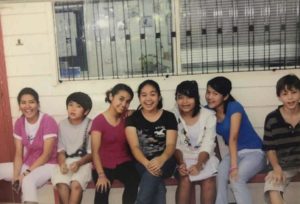
What is your favourite ISPP memory?
I made so many lovely memories at ISPP – MRISA tournaments, formals, Week Without Walls, Battle of the Bands! The most memorable of all would have to be acting in the play Monika Song-ngam wrote, directed, and acted in for her IB theatre project, entitled “Sincerely, yours”. I played a character who is part of the LGBTQ+ community and it was such a novel experience for me, both in terms of acting and educating myself about the topic.
What was your favourite subject or who was your favourite teacher?
I genuinely liked all of the subjects I studied and all of the teachers as well. Yet, if I were to choose, it would have to be economics, literature, science/biology, and art. All of the teachers had such a profound influence on me and helped me grow on a personal and intellectual level, particularly classes in which Ms Shaw, Mr Krupp, Mr Webster, Mr Etienne and Mr Underhill had taught.
What was your favourite school lunch or snack?
This question makes me recall how fast I would run to queue up for the Shop’s oatmeal raisin and chocolate chip cookies when the bell rang for recess – so crispy, yet chewy, and packed with delectable flavours! Yum! Then in 2011, the cafeteria started to also sell kuy teav and meecha; I have to say, I am definitely partial towards the kuy teav – the carrots, radish, flat white noodles, and the soup’s savoury, garlicky flavour – I am salivating just by thinking about it!
What was your most memorable song in ISPP years?
When I think about my years at ISPP, a few songs come to mind: Big Bang’s Haru Haru, Taylor Swift’s Love Story, High School Musical, Eminem, and Tyga’s hits were my jam!
What would you tell your high school self?
I would tell my high school self to live in the moment, to stop worrying too much, and to believe in myself more.
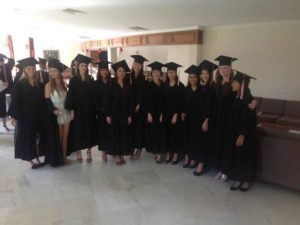
Have you visited ISPP since you graduated? If so, how much has it changed?
Yes, twice I believe. Once in either 2015 or 2016 to visit campus and then another visit in 2017 for my cousin’s graduation. While there was a certain allure to the homey vibes at the old Campus situated along, I like the new facility and how spacious the new campus is! I was able to see some familiar faces during the last time I was there: Mr Dara, Mr Sakada, Mr Webster, Mr Underhill, Ms Suzie, and Mr Coles!
How much has Phnom Penh changed since you attended ISPP?
One of the most palpable differences would have to be the infrastructure – so many new buildings, skyscrapers, and malls! On the social level, I am under the impression that communities in Phnom Penh, especially amongst youths, have been relatively more progressive and active in advocating or raising awareness on issues concerning colourism and body image, mental health, equal rights concerning gender and LGBTQ+, the environment and sustainability.
What other jobs do you wish to work next?
In the future, I would like to further enhance my research skills and I am still contemplating some options for my profession in the long term. As of now, I am highly considering working for either an independent research think tank, a multilateral institution, or going into academia.
This interview was first published in the ISPP Pulse Magazine (November 2021 – January 2022).
More “Where Are They Now?” interviews:
- Frank van Zoggel (1991 – 1993)
- Sharlynn Ng (2005-2010)
- Brian Webster (2002-2016)
- Thida Leiper (1991 – 2005)
- Armando Abrahamsson (2010 – 2012)
- Luca Fleschler, Fraya Fleschler, Ximena Herrera (2011-2017)
- Dany, Soriya and Kalyane Warren (1996-2001)
- Nadia Fernando (1999-2015)
- Lotta Urban (1998-1999)
- Sreyneath Poole (2000-2005)
